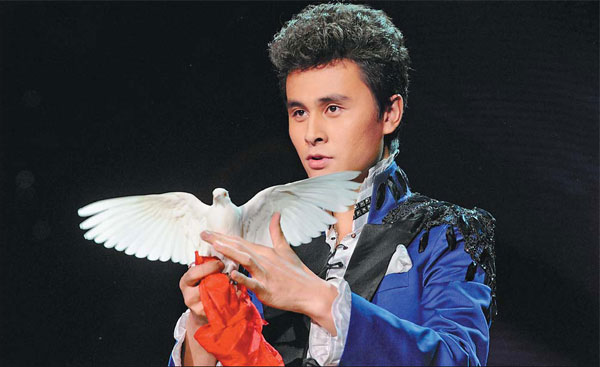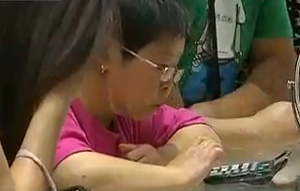Weaving their own magic
Updated: 2013-06-05 05:55
By Eric Jou (China Daily)
|
|||||||||||
|
Chinese magician Mr Black (Liu Shijie) gets ready to make a dove disappear. Provided to China Daily |
Every trick in the magician's repertoire has three acts, and it seems that China's magic industry is waiting for its final act. Eric Jou pulls some interesting facts out of the hat.
It is generally known that a magic trick is broken into three parts: the pledge, the turn and the final prestige, inside knowledge exposed by Christopher Nolan's 2006 movie, The Prestige.
In the pledge, the magician tells his audience what he's about to do, either make a ball disappear or make the bunny vanish. Then he performs what he promises, an act named the turn. Finally, he makes the object re-appear in the last part of the trick, known as the prestige.
If it is broken down like the parts of a magician's trick, China's burgeoning performance magic industry is waiting to return to the forefront of the spotlight. Unlike magic shows in the West, magic performances in China tend to be either part of a television program or part of an acrobatics variety show.
While magic and magic-related performances have been part of China and Chinese history for a very long time, Western-style magic performance didn't take off until relatively recently, in tandem with other Western influences. It was helped off the ground when Taiwanese magician Liu Chen performed on China Central Television's Spring Festival Gala in 2009, according to Lin Lei, show runner for Shenzhen Satellite TV.
"When Liu Chen first appeared on CCTV's Spring Festival Gala, it created a wave of interest that resulted in almost every TV station trying to create its own magic variety show," says Lin, who helped establish one of the first magic variety programs for broadcast in China in 2009. The show, Citizens' Magic Mirror, was telecast on Dongnan Satellite TV until 2010, launching the careers of many magicians across China.
While television became the main stage for Chinese magicians to perform, Lin says that it also reflected the stunted growth of the magic industry.
"Right now, magic in the eyes of traditional television media is out of fashion," Lin says.
It was mainly due to the lack of independent platforms and channels to perform that magicians in China attached themselves to acrobatics troupes. In fact, the trade association for magicians is currently listed as a sub-section under the Chinese Acrobatics Association.
It was also this famine of opportunities that made magicians turn to TV.
"There was so much exposure of magic," says Lin. "Unfortunately, magic isn't something that you can show over and over again, magicians need time to create new tricks and TV schedules don't allow for that."
On top of the restraints imposed by television, Lin says Chinese magicians suffer from a lack of international interest, a sad state that creates a gulf that prevents interaction between magicians from China and their international peers.
Shanghai has held the Shanghai International Magic Festival and Competition seven times in the last 20 years and Beijing held an International China Magic Fair in 2012. Despite these, the majority of forums and meetings take place in the West.
"In China there are very few magicians worthy of the title, master," Lin says. "Learning opportunities are very limited in China."
Chinese magician Mr Black received his first big break on TV, performing various feats of close-up magic, magic that includes sleight of hand. Mr Black is Liu Shijie, a self-taught magician who says he had to learn from watching videos of other magicians performing.
Liu, from Heilongjiang province, has moved around China. He recently relocated from Shanghai to Beijing in search of more opportunities.
He taught himself magic when he was 12, starting with videos of card tricks, and later the acts with the disappearing doves.
Liu made his debut in 2008 and following in the footsteps of Liu Chen and other magicians, appearing on television.
Tall, dark and handsome, Liu says his performance is getting better as he learns more. He earned the nickname Mr Black on account of his all black attire and his lack of expression while performing. However, as TV appearances become few and far between, Liu is branching out into teaching, and the private circuit.
"More and more people want to see magic," he asserts. "We have requests from lots of companies and private events."
To Liu, magic is something for the people and he says more people than ever are interested in watching a good performance, and that more are also beginning to appreciate the entertainment value found in magic shows.
Sadly, Liu also notes that the environment is not exactly conducive. He points out a lack of venues solely for magic, a lack of qualified masters to teach the craft and the "weird" lack of a magic association in China to address the current issues of the craft.
"Magic and acrobatics are separate entities in the West. To have our own independent association will help the industry grow. It will also ensure and promote proper performance venues," he says. "Magic is something best seen with your own eyes, and not through a television screen. TV separates you from the action and it lacks a certain impact."
Liu wants to be able to teach magic to as many people as possible, something that he feels magic in China needs right now.
American performer Chris Parsons, who goes by the stage name Mr Magic, works and performs for children in Beijing. Parsons currently mentors a number of Chinese and foreign magicians and he says that China's magic performers are ready for a comeback because the audience is there.
Parsons says Chinese magicians have the skill and know-how to compete with the best magicians around the world. They just lack the packaging.
"In China, they have the technical skills," says Parson. "But they lack the showmanship, and this is the part they need to work on
"I think people are waiting for the next step. They need more than just the tricks. They want the full show."
Contact the writer at ericjou@chinadaily.com.cn.
(China Daily 06/05/2013 page22)
Today's Top News
Solar duties risk China-EU trade ties
Protectionism hurts EU exports to China
Chinese president arrives in Mexico for state visit
EU imposes duties on solar products
China is victim of hacking attacks
Police advise women to 'cover up'
Beijing to have more clean-energy taxis
Author's widow claims court victory
Hot Topics
Lunar probe , China growth forecasts, Emission rules get tougher, China seen through 'colored lens', International board,
Editor's Picks

|

|

|

|

|

|






